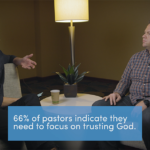
… But Going to Church Helps
When it comes to the Bible, many seem to have only read the CliffsNotes. But going to church helps attendees know more of the story.
By Aaron Earls
When it comes to Christian doctrine and the Bible, many evangelicals seem to have only read the CliffsNotes version. But going to church helps attendees know more of the story.
A new Lifeway Research study explores the theological beliefs of all Americans, including evangelicals.
The online survey, sponsored by Ligonier Ministries, asked 47 theology questions and found most Americans are confused about theology. On many issues, evangelicals, as identified by the National Association of Evangelicals and Lifeway Research definition, overwhelmingly stuck to their historic beliefs.
More than 9 in 10 evangelicals hold traditional orthodox views about a host of theological issues ranging from God being perfect to sex outside of traditional marriage being a sin.
Virtually all evangelicals (97 percent) agree there is one God who exists in three persons: Father, Son, and Holy Spirit. But surprisingly large percentages also believe Jesus is a created being and the Holy Spirit is a force, not a person.
Seven in 10 evangelicals (71 percent) said Jesus is the first and greatest being created by God. Historic Christian teaching is that Jesus is eternally God and is not created.
Seeing these numbers are not necessarily surprising for Nathan Finn, dean of the school of theology and missions at Union University in Jackson, Tennessee. “Lots of professing Christians believe Jesus is divine in some sense, and certainly worthy of our worship, but they don’t necessarily equate that with Him being eternal and uncreated,” he said.
Other Persons of the Trinity also confuse many evangelicals. More than half (56 percent) say the Holy Spirit is a force and not a personal being. Almost 3 in 10 (28 percent) believe the Holy Spirit is divine, but not equal with God the Father or Jesus.
Finn says the biblical language of “spirit” could confuse some people who have been in contexts where there was a lack of clear teaching on the person and work of the Holy Spirit.
“It is a great mystery that the Spirit is both a spirit and a person, so it’s understandable so many are confused by this truth,” he said. “This is all the more reason we must be diligent about clear teaching on the Spirit.”
These and other deviations from orthodox Christian teaching could stem from American evangelicals’ approach to reading the Bible and being part of a church. Three in 10 (30 percent) say the Bible was written for each person to interpret as they choose. And 4 in 10 (42 percent) say worshipping alone or with family is a valid replacement for church attendance.
This shows we are “as influenced by American individualism as we are the Christian worldview,” said Finn. “The Protestant Reformers taught that every honest Bible reader could discern how to be saved and understand basic Christian ethics. In America, we’ve taken that idea and devolved it into a ‘me and my Bible are enough’ mentality.”
Instead, Finn says, “The Bible is meant to be read and interpreted in the context of the entire believing community, with the help of pastors who have the gift of teaching.”
When looking at the Lifeway Research study, church attendance seemed to help evangelicals stay closer to orthodoxy.
Among other things, evangelicals who attend church at least once a month were:
- Less likely to believe God accepts the worship of all religions (46 percent) compared to those who attend church less than once a month (58 percent).
- More likely to believe the Bible is 100 percent accurate in all that it teaches (97 to 91 percent).
- More likely to believe the Bible has the authority to tell us what we must do (97 to 90 percent).
- Less likely to believe Jesus is the first and greatest being created by God (69 to 81 percent).
- Less likely to believe the Holy Spirit is a force, not a personal being (53 to 66 percent).
- Less likely to believe the Holy Spirit is divine, but not equal with God the Father and Jesus (25 to 39 percent).
- Less likely to believe everyone sins a little, but most people are good by nature (50 to 70 percent).
- Less likely to believe that good deeds can partly contribute to earning a place in heaven (36 to 48 percent).
- Less likely to believe God is unconcerned with my day-to-day decisions (14 to 22 percent).
- Less likely to believe that worshipping alone or with family is a valid replacement for regularly attending church (35 to 66 percent).
For churches looking to help their attendees better understand theology, Finn says there isn’t a one-size-fits-all approach, but “every church needs an intentional strategy for cultivating theological formation.”
It will look different in every situation, he says, “but every church needs a pastor-led strategy that helps members mature theologically as part of their overall strategy for helping members to mature spiritually.”










